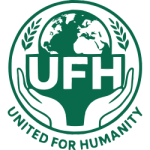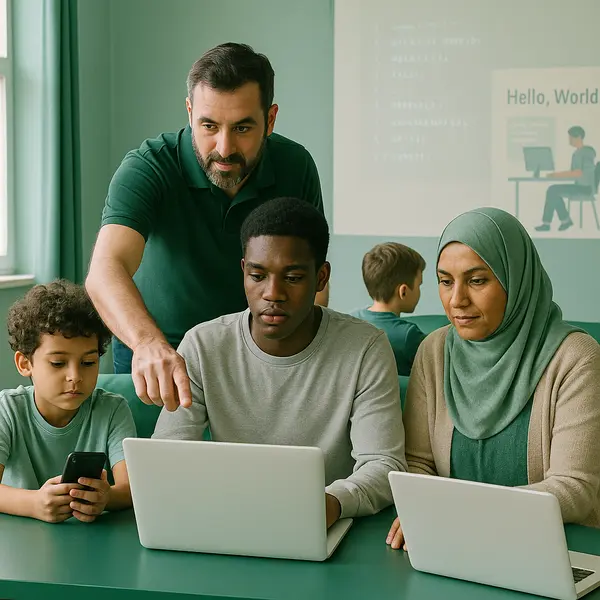Every day, digital access determines not only how we communicate with friends and family, but also how we learn, find work, secure vital services, and rebuild our lives. For refugees—forced to flee their homes, often arriving in new countries with few possessions and limited language skills—the lack of access to technology can mean one more barrier standing between them and opportunity. At United for Humanity (UFH), we believe that equipping refugees with the digital tools, training, and support they need is as essential as providing shelter or legal counsel. Through targeted programs, partnerships, and personalized coaching, UFH is on a mission to close the digital divide and unlock pathways to independence for displaced families around the world.
Understanding the Digital Divide in Displacement Contexts
The “digital divide” refers to gaps in access to devices, connectivity, and digital literacy. In displacement settings, these gaps are often exacerbated by:
Resource Scarcity: Refugee camps and reception centers frequently lack reliable internet infrastructure and computers.
Economic Barriers: Even when services exist, high costs of smartphones, data plans, or laptops put them out of reach.
Language & Skill Gaps: New arrivals may not know the host country’s language or have ever used digital platforms.
Psychosocial Challenges: Trauma, stress, and the daily struggle for housing and food leave little mental bandwidth for learning new technologies.
Without intervention, these factors can leave refugees on the wrong side of a widening technological chasm—unable to apply for jobs online, access telehealth appointments, or enroll their children in virtual classrooms.
UFH’s Four-Pillar Approach to Digital Empowerment
To tackle these challenges head-on, UFH has developed a comprehensive, four-pillar strategy:
Device Distribution & Connectivity
Refurbished Laptop Program: Collaborating with corporate partners and nonprofit refurbishers, UFH secures gently used laptops, tablets, and smartphones. After rigorous testing and data wiping, devices are distributed to refugee families at no cost.
Connectivity Vouchers: Through partnerships with local internet service providers, UFH issues monthly data vouchers or subsidized Wi-Fi access for enrolled participants.
Tailored Digital Literacy Training
Foundations Workshops: Beginners learn basic computer skills—navigating operating systems, setting up email accounts, and safe internet browsing.
Specialized Tracks: Job-seekers receive modules on online job portals, resume-building platforms, and virtual interview practice. Parents learn to use educational apps to support their children’s remote learning.
One-on-One Tech Coaching
Digital Mentors: UFH recruits volunteers with IT backgrounds to conduct individualized coaching sessions—either in person or via video call. These mentors troubleshoot device issues, guide refugees through online forms (e.g., social services applications), and build confidence.
Peer Support Circles: Small group meetups foster peer-to-peer learning, where participants share tips, exchange troubleshooting hacks, and build social connections.
Community & Partnership Integration
Local Library & NGO Linkages: UFH brokers agreements for refugees to use public library computer labs and digital learning centers run by partner NGOs.
Corporate Volunteer Programs: Tech companies volunteer their employees to teach coding bootcamps, digital marketing seminars, and cybersecurity basics.
Real-World Impact: Success Stories
Case Study 1: Omar’s E-Commerce Breakthrough
Background: Omar, a former graphic designer, arrived with limited English and no computer of his own.
Intervention: UFH provided him with a refurbished laptop and enrolled him in a twelve-week “Digital Entrepreneurship” track. With guidance from a volunteer mentor, he built an online portfolio, learned to navigate e-commerce platforms, and set up a small print-on-demand shop.
Outcome: Within six months, Omar had generated over $1,200 in sales, enough to cover his family’s basic expenses. Today, he’s mentoring other refugees in UFH’s peer support circle, paying forward the skills he acquired.
“I never imagined I could run my own online store. UFH didn’t just give me tech—they gave me hope.”
Case Study 2: Leila’s Language-Learning Leap
Background: Leila, a mother of two, struggled to help her children with remote schooling because she couldn’t download or use educational apps on her outdated phone.
Intervention: UFH distributed a tablet preloaded with child-friendly learning software and provided a caregiver-focused workshop on navigating digital classrooms. A digital mentor spent several one-on-one sessions teaching her how to update apps, join video calls, and troubleshoot connectivity issues.
Outcome: Leila now confidently assists her children during virtual classes and has even started attending her own English-language webinars. Her improved skills led to a part-time job assisting at a local community center’s digital literacy program.
“Seeing my children learn online inspired me to learn alongside them. Now we navigate their school apps together.”
Measuring Success
Since launching our digital empowerment initiatives in early 2023, UFH has achieved:
1,500+ Devices Distributed to refugee families in three regions.
2,200+ Participants Trained through workshops covering basic to advanced digital skills.
750+ One-on-One Coaching Hours logged by volunteer mentors.
45% Increase in job-search platform engagement among program alumni within three months of graduation.
These metrics underscore the transformative potential of digital inclusion—but they also highlight ongoing needs as technology continues to evolve.
Looking Forward: Scaling and Innovation
To stay ahead of emerging digital trends and meet growing demand, UFH plans to:
Expand Virtual Reality (VR) Training Labs: Pilot programs using VR for immersive language practice and vocational simulations.
Launch a Mobile App: A centralized UFH digital hub where refugees can book coaching sessions, access learning modules, and connect with peers.
Strengthen Cybersecurity Education: Given rising online risks, introduce dedicated modules on safe password practices, recognizing phishing attempts, and protecting personal data.
How You Can Help Bridge the Divide
Digital empowerment is a community effort. Here’s how you can make an impact:
Donate a Device: Contribute your gently used laptop or smartphone through our Device Giveback program.
Volunteer Your Expertise: Whether you’re an IT specialist, teacher, or simply tech-savvy, your time as a digital mentor can change lives.
Sponsor Connectivity: Help fund data vouchers or Wi-Fi access to ensure uninterrupted learning and communication.
Visit ufh.info/digital-empowerment to learn more and get involved today.
Conclusion
In a world ever more reliant on technology, ensuring that refugees are not left behind is both a moral imperative and a practical necessity. By distributing devices, delivering tailored training, and fostering supportive networks, UFH is lighting the way for displaced families to reclaim autonomy, rebuild livelihoods, and connect with the broader world. When we bridge the digital divide, we open doors—to education, to employment, to community—and ultimately, to hope.


